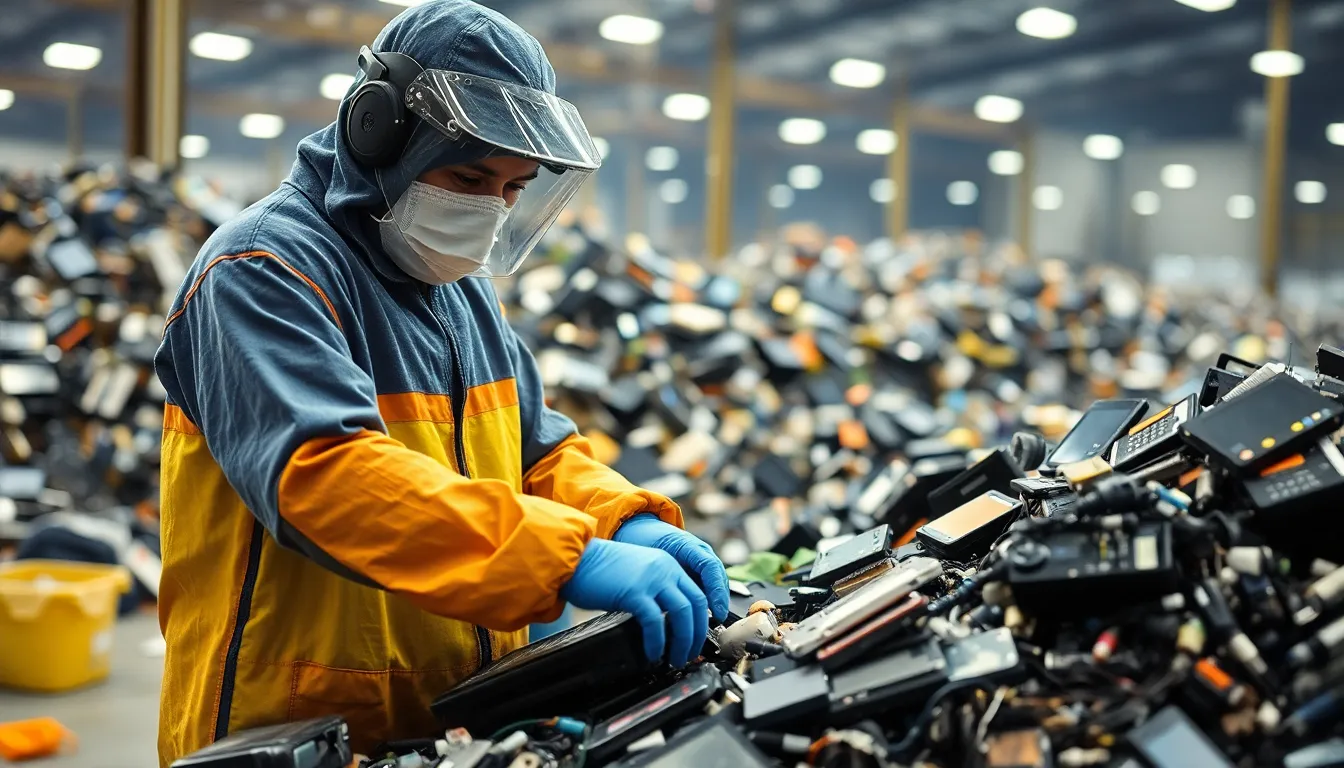In a world overflowing with gadgets, e-waste is piling up faster than a teenager’s dirty laundry. Every year, millions of tons of discarded electronics are tossed aside, creating a ticking time bomb for our planet. But fear not! The latest e-waste recycling news reveals innovative solutions and eco-friendly initiatives that could turn this electronic graveyard into a treasure trove of materials.
From quirky startups to government policies, the e-waste recycling landscape is buzzing with activity. It’s not just about saving the planet; it’s about making money while doing it! As technology evolves, so do the ways to responsibly recycle it. Dive into the latest updates and discover how everyone can play a part in this electrifying movement. Who knew saving the Earth could be so cool?
Table of Contents
ToggleRecent Developments in E-Waste Recycling News
Innovations in e-waste recycling technology continue to emerge, driving efficiency and sustainability. New processes like hydrometallurgical techniques allow for the recovery of precious metals from electronics with minimal environmental impact. Automation in recycling facilities enhances sorting and processing speed, reducing labor costs. Moreover, advances in artificial intelligence improve the identification of recyclable materials, promoting better recovery rates.
Regulatory changes significantly impact e-waste disposal practices across many regions. The European Union’s updated Waste Electrical and Electronic Equipment Directive mandates stricter recycling targets for member states. Similarly, states in the U.S. are enacting legislation that encourages safe e-waste recycling methods and imposes penalties on improper disposal. Implementing stricter regulations on e-waste management fosters responsible recycling behavior among consumers and manufacturers alike.
Environmental Impact of E-Waste
E-waste significantly affects the environment, contributing to pollution and resource depletion. Understanding its components and exploring effective recycling solutions become crucial in addressing these impacts.
Toxic Components and Their Effects
E-waste contains hazardous materials like lead, mercury, and cadmium. Lead exposure can lead to neurological issues, especially in children, while mercury contamination affects aquatic ecosystems. Cadmium, often found in batteries, poses risks to soil and water quality. According to the World Health Organization, improper disposal results in over 50 million tons of e-waste generated globally, highlighting the urgency of addressing these toxic components.
Benefits of Effective Recycling
Effective recycling of e-waste generates significant environmental benefits. Recovering valuable materials such as gold, silver, and copper reduces the demand for raw mining, which often harms ecosystems. Recycling can prevent around 1.2 million tons of carbon emissions annually by reducing energy consumption. Additionally, responsible recycling creates job opportunities in the green economy, promoting sustainable practices. Advanced recycling processes enhance material recovery rates, leading to higher environmental efficiency.
Global Trends in E-Waste Recycling
E-waste recycling is evolving globally, with innovative practices emerging. Leading countries exemplify effective solutions and remarkable progress in e-waste management.
Case Studies from Leading Countries
Germany ranks among the top in e-waste recycling, achieving a collection rate of about 45%. The country implements a robust system, requiring manufacturers to take responsibility for end-of-life electronics. Japan follows, utilizing advanced automation for efficient sorting. Their recovery rates for valuable materials like rare earth metals reach over 93%. In Sweden, legislation focuses on promoting repair and refurbishing before recycling. This approach significantly reduces waste and enhances material recovery.
Emerging Markets and Their Approaches
In India, new startups aim to revolutionize e-waste recycling by establishing localized facilities. These initiatives focus on creating employment while promoting responsible disposal practices. Brazil prioritizes awareness campaigns, educating consumers on the importance of recycling electronics. Their local partnerships facilitate collection drives, increasing recycling rates in urban areas. South Africa explores community-based recycling programs to address e-waste challenges. These approaches seek to promote sustainability while boosting economic opportunities.
Challenges Facing E-Waste Recycling Industry
The e-waste recycling industry encounters various challenges that hinder its growth and effectiveness. Significant hurdles include collection and processing issues that affect the recycling lifecycle.
Collection and Processing Issues
Collection and processing of e-waste often face logistical challenges. Insufficient infrastructure limits accessibility to drop-off locations for consumers. Additionally, improper handling during collection results in damage to recyclable materials. Facilities struggle with inefficient sorting technologies, which can reduce recovery rates. Delays in processing due to regulatory constraints can also stall initiatives aimed at improving recycling efficiency. Investing in advanced sorting systems and expanding collection networks could enhance overall processing capabilities.
Consumer Awareness and Participation
Consumer awareness significantly impacts participation in e-waste recycling programs. Many individuals remain uninformed about proper disposal methods for electronics. Educational campaigns targeting these gaps would encourage more responsible recycling behaviors. Misconceptions about e-waste recycling’s effectiveness can deter participation as well. Engaging community programs that promote accessible recycling options fosters greater involvement. Implementing outreach initiatives could increase awareness and make recycling an integral part of consumers’ behaviors.
Conclusion
The future of e-waste recycling is bright and full of promise. With innovative technologies and regulatory advancements paving the way for responsible disposal practices, there’s a growing movement toward sustainability. As countries adopt effective recycling strategies and raise awareness, individuals and businesses are encouraged to participate in this essential effort.
Every small action contributes to a larger impact on the environment and the economy. By embracing e-waste recycling, society can mitigate health risks, reduce pollution, and unlock valuable resources. The journey toward a greener future begins with informed choices and active engagement in e-waste recycling initiatives.





